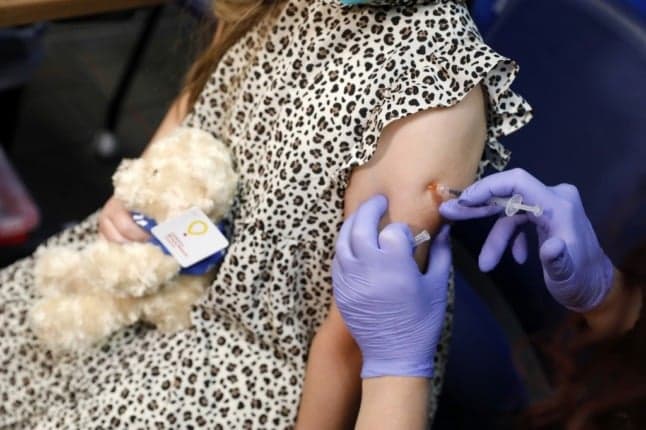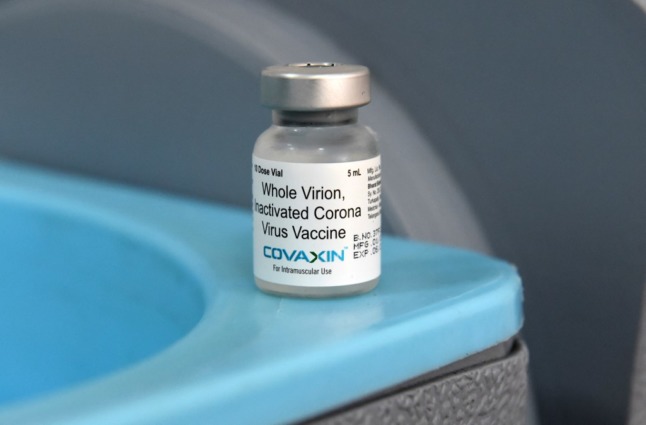Today in Switzerland: A round-up of the latest news on Wednesday

Find out what's going on today in Switzerland with The Local's short roundup of the news.
Swiss health expert: Covid cases “double every two weeks"
There has been a significant increase in new coronavirus infections in Switzerland — nearly 3,000 cases were reported on Tuesday.
"They double every two weeks", according to Virginie Masserey, head of the infection control section at the Federal Office of Public Health.
Only a few weeks ago, Switzerland registered fewer than 1,000 daily cases, but the epidemiological situation worsened with the arrival of cold weather, which drove people indoors, where the virus spreads quicker.
Also, “nearly a million people in Switzerland who are still unvaccinated”.. Masserey said.
However, the number of Covid-related hospital admissions is not soaring as quickly as that of new cases. “The situation in intensive care is stable”, Masserey said, meaning that, at least for the time being, Switzerland’s healthcare system is not on the verge of being saturated.
READ MORE: Switzerland’s Covid cases are soaring again. Here’s why
Swiss children taken abroad to get Covid shots
In Switzerland, coronavirus vaccines are not yet available for children under the age of 12, so some parents are taking their young children to foreign countries to be immunised.
For instance, according to media reports, parents from eastern Switzerland go to Germany and Austria to inoculate their kids, even though EU regulators have not authorised any Covid vaccines for young children either.
The technical term for this kind of practice is “off-label”, meaning that vaccines are administered without official approval.
In Switzerland, children under 12 are given Covid vaccines only in special, pediatrician-approved cases involving compromised immunity or other serious health problems; in all. 150 youngsters who met this criteria have been inoculated to date.
Immunisation of children aged five and over will likely be approved in Switzerland in 2022, said Christoph Berger, head of the country’s vaccination committee.
Switzerland accepts Covaxin as proof of immunity
The Federal Office of Public Health has now recognised India-made Covaxin, which means tourists inoculated with this vaccine can enter Switzerland and have access to the Covid certificate.
Switzerland green-lighted Covaxin after the World Health Organization (WHO) issued an emergency use listing for the vaccine on November 3rd, making it the seventh vaccine eligible for the country’s certificate.
The others are Pfizer, Moderna, Johnson & Johnson, AstraZeneca, Sinopharm, and Sinovac.

India's Covaxin vaccine is accepted in Switzerland. Photo by NORBERTO DUARTE / AFP
READ MORE: Reader question: Can I convert my foreign vaccination pass into a Swiss Covid certificate?
Swiss healthcare among the best in the world
Switzerland scores highly in the new data on the state of health systems in 38 countries that are members of the Organization for Economic Co-operation and Development (OECD).
The study found that Swiss healthcare system remains one of the best of all OECD countries.
Switzerland is above average in terms of access to healthcare, with a rate of 100 percent, against 98 percent in the OECD. The satisfaction rate is also very high: 91 percent in Switzerland, compared to 71 percent in other countries.
The report counts 4.4 doctors and 18 nurses per 1,000 inhabitants in Switzerland, against 3.6 and 8.8 respectively on average. Switzerland also has a total of 4.6 hospital beds per 1,000 inhabitants, slightly more than the average for OECD countries (4.4).
However, Swiss healthcare comes at a cost. Spending amounts to 11.3 percent of GDP, compared to 8.8 percent on average in the OECD. For long-term care, costs amount to 2.4 percent of GDP, against 1.5 on average.
If you have any questions about life in Switzerland, ideas for articles or news tips for The Local, please get in touch with us at [email protected]
Comments
See Also
Swiss health expert: Covid cases “double every two weeks"
There has been a significant increase in new coronavirus infections in Switzerland — nearly 3,000 cases were reported on Tuesday.
"They double every two weeks", according to Virginie Masserey, head of the infection control section at the Federal Office of Public Health.
Only a few weeks ago, Switzerland registered fewer than 1,000 daily cases, but the epidemiological situation worsened with the arrival of cold weather, which drove people indoors, where the virus spreads quicker.
Also, “nearly a million people in Switzerland who are still unvaccinated”.. Masserey said.
However, the number of Covid-related hospital admissions is not soaring as quickly as that of new cases. “The situation in intensive care is stable”, Masserey said, meaning that, at least for the time being, Switzerland’s healthcare system is not on the verge of being saturated.
READ MORE: Switzerland’s Covid cases are soaring again. Here’s why
Swiss children taken abroad to get Covid shots
In Switzerland, coronavirus vaccines are not yet available for children under the age of 12, so some parents are taking their young children to foreign countries to be immunised.
For instance, according to media reports, parents from eastern Switzerland go to Germany and Austria to inoculate their kids, even though EU regulators have not authorised any Covid vaccines for young children either.
The technical term for this kind of practice is “off-label”, meaning that vaccines are administered without official approval.
In Switzerland, children under 12 are given Covid vaccines only in special, pediatrician-approved cases involving compromised immunity or other serious health problems; in all. 150 youngsters who met this criteria have been inoculated to date.
Immunisation of children aged five and over will likely be approved in Switzerland in 2022, said Christoph Berger, head of the country’s vaccination committee.
Switzerland accepts Covaxin as proof of immunity
The Federal Office of Public Health has now recognised India-made Covaxin, which means tourists inoculated with this vaccine can enter Switzerland and have access to the Covid certificate.
Switzerland green-lighted Covaxin after the World Health Organization (WHO) issued an emergency use listing for the vaccine on November 3rd, making it the seventh vaccine eligible for the country’s certificate.
The others are Pfizer, Moderna, Johnson & Johnson, AstraZeneca, Sinopharm, and Sinovac.

READ MORE: Reader question: Can I convert my foreign vaccination pass into a Swiss Covid certificate?
Swiss healthcare among the best in the world
Switzerland scores highly in the new data on the state of health systems in 38 countries that are members of the Organization for Economic Co-operation and Development (OECD).
The study found that Swiss healthcare system remains one of the best of all OECD countries.
Switzerland is above average in terms of access to healthcare, with a rate of 100 percent, against 98 percent in the OECD. The satisfaction rate is also very high: 91 percent in Switzerland, compared to 71 percent in other countries.
The report counts 4.4 doctors and 18 nurses per 1,000 inhabitants in Switzerland, against 3.6 and 8.8 respectively on average. Switzerland also has a total of 4.6 hospital beds per 1,000 inhabitants, slightly more than the average for OECD countries (4.4).
However, Swiss healthcare comes at a cost. Spending amounts to 11.3 percent of GDP, compared to 8.8 percent on average in the OECD. For long-term care, costs amount to 2.4 percent of GDP, against 1.5 on average.
If you have any questions about life in Switzerland, ideas for articles or news tips for The Local, please get in touch with us at [email protected]
Join the conversation in our comments section below. Share your own views and experience and if you have a question or suggestion for our journalists then email us at [email protected].
Please keep comments civil, constructive and on topic – and make sure to read our terms of use before getting involved.
Please log in here to leave a comment.